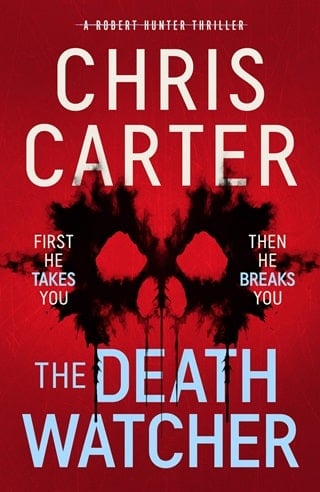Chapter Thirty-Five
Once Captain Blake had left their office, Garcia leaned against the edge of his desk and faced Hunter.
‘So what will the plan of action be here?' he asked, folding his arms in front of his chest. ‘I mean, where do you want to start with all this?'
Hunter walked over to the coffee machine and poured himself a cup. ‘Coffee?'
Garcia nodded.
Hunter poured a second cup and handed it to his partner.
‘If we're right on this,' he began, ‘then our main priority is to figure out who could have that knowledge… and how did they get it.'
‘Knowledge about the physical violence, you mean?'
‘Yes. You heard what Joe said on the phone. He never told anyone about it. He never wrote it down, never kept a hidden journal, nothing… and as far as he knows, neither did his mother. Maybe his sixth-grade teacher suspected it, but even if she had told anyone about her suspicions, and whoever she told wanted to act on it—'
‘Why do it now?' Garcia picked up the thread. ‘About ten years later.'
‘Not only that,' Hunter added. ‘But if Joe's teacher did tell anyone, chances are that whoever she told is from Phoenix, where they lived at the time, not LA. Considering that both of our victims were taken, tortured and murdered in LA, I don't think this killer is crossing state lines, Carlos. Whoever he is, he's based here.'
‘Yeah, I agree.'
Hunter sipped his coffee. ‘So here's our problem – how did this killer gain knowledge, not only of the fact that Joe Wilford had experienced severe physical violence at the hands of his father years ago and while living in Phoenix, Arizona…' He lifted a finger for emphasis. ‘But also of the exact type of injuries inflicted onto him? Those injuries didn't happen all at once, Carlos – the broken arms, the cigarette burns, the burning eye-drops, and whatever else – each of those injuries happened at different times, spread over several years. According to Joe, he never went to the hospital for his injuries, so there should be no official record. If Joe really never wrote any of it down, then how the hell did this killer get such detailed information?'
Garcia had a healthy sip of his coffee. ‘Maybe his mother kept a diary.'
Hunter shook his head. ‘And what? Somehow, ten years later, that diary ends up in the hands of a murderer here in LA, which so happens to be the exact same city that Terry Wilford moved to after he left Arizona? I don't think so.'
Garcia didn't argue. ‘But someone has to have passed on that information.'
‘True,' Hunter agreed. ‘And by elimination, we're left with just one option. There's only one person left in the equation who knew about all the violence… all the injuries.'
‘Terry Wilford himself,' Garcia said, indicating a profile photo on the board.
‘Yep.' Hunter finished his coffee and sat back on his chair.
‘But wouldn't that make even less sense?' Garcia countered. ‘He was the violent one. He was the one who lashed out against his wife and kid. Why would he tell anyone about his violent personality? It's not exactly a quality people would want exposed, Robert.'
‘It might make a lot more sense than you think, Carlos.'
‘Really? How?'
‘Simple,' Hunter replied. ‘Guilt. It takes a real special kind of psychopath to not know that what he was doing was wrong – the violence, the beatings… all of it – especially when that violence was perpetrated against his own wife and kid. That knowledge almost always manifests itself as guilt, shame, or a combination of both. And that internal guilt would be the main player on the type of mood swings that Joe told us his father used to have.' Hunter tapped his notepad with the tip of his index finger. ‘Going from being violent to being remorseful in no time. That guilt and shame, combined with violent mood swings that can't be controlled, can very easily push a person to seek help.'
Garcia paused for a beat. ‘Are you talking about therapy?'
‘Why not?' Hunter questioned back. ‘When we're ill and we know we're ill, we seek help, don't we? We go to the doctor – it's normal behavior. I'm sure that Terry Wilford knew that his mood swings weren't right, and most of the battle against controlling anger is won by understanding where that anger is coming from. A therapist, or even an anger-management specialist, can help you do that.'
Garcia thought about it for a moment. ‘But wouldn't it make more sense for him to seek help back in Arizona? While the violent mood swings were taking place?'
‘And he might have,' Hunter replied. ‘We don't know, but if he did and it helped – and therapy usually does help – he might've wanted to carry on with the sessions once he relocated. Maybe he feared that, without therapy, his violent behavior had a bigger chance of coming back. Maybe he started seeing signs of it again.'
Before Garcia could say anything back, the phone on Hunter's desk rang.
Hunter leaned forward and reached for it. It was Shannon Hatcher, the head of the Research team.
‘Shannon,' Hunter said, as he switched the call to speakerphone. ‘Please tell me you've managed to find something.'
There clearly was a smile hanging on the corners of her words.
‘You can thank me later, Robert.'
 Fullepub
Fullepub 



